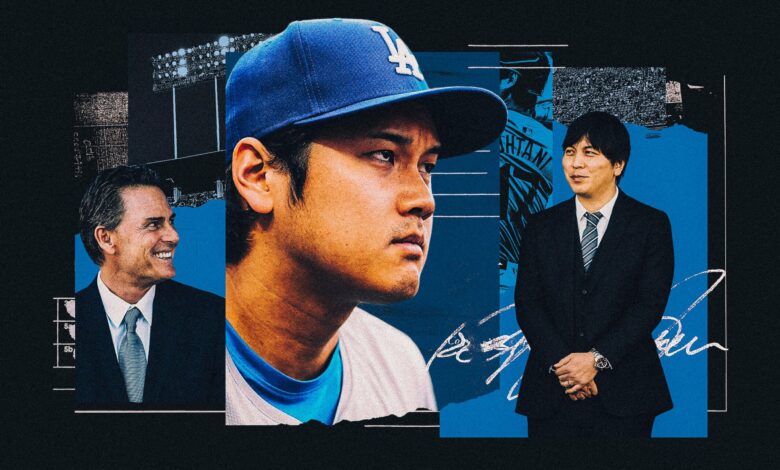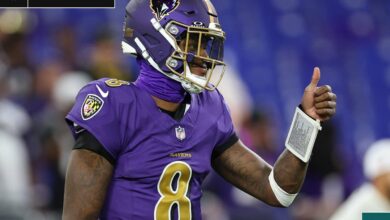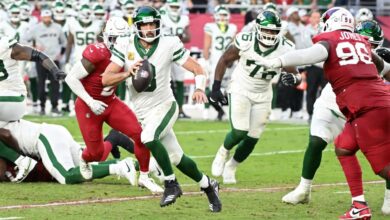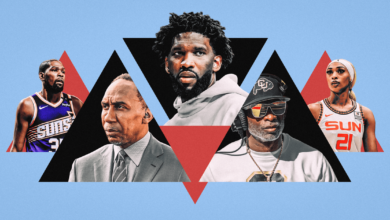The insular relationships that protected Shohei Ohtani — until they didn’t

Someone always wanted something from Shohei Ohtani. An autographed baseball. A special meeting on the field. But often during his time with the Angels, Ohtani could not be bothered. His regimen as a two-way player left him with limited time. His preference was to focus only on baseball.
Virtually every request needed to go through Ohtani’s agent, Nez Balelo of CAA. Many of them were denied. But was it Ohtani actually balking? Was his interpreter, Ippei Mizuhara, interceding? Or was it Balelo making the call? The three formed such a united front, such a protective cocoon, the Angels could not always tell.
One Angels official likened Team Ohtani to “a well-oiled machine,” efficient and impenetrable.
Or so people thought.
The insular relationship among Ohtani, Mizuhara and Balelo, marked by immense trust despite a language barrier that hindered their communication, created the landscape for the unthinkable — Mizuhara’s theft of almost $17 million from Ohtani to cover gambling debts, and his plea of guilty last month to charges of bank and tax fraud. The two counts carry a maximum sentence of 33 years.
Could Mizuhara have pulled off such a theft without Ohtani and Balelo knowing? The only way it was even plausible was because of the unusual dynamic among the three, as detailed by more than 25 past and present Angels employees, Dodgers officials and others familiar with the evolution of their relationship. Many of those who spoke to The Athletic were granted anonymity so that they could speak candidly. Ohtani, Balelo and Mizuhara declined to answer questions for this story.
As one Angels employee put it, Ohtani’s whole world was baseball, and Balelo’s whole world was Ohtani. Mizuhara, the only one of the three fluent in both English and Japanese, filled the communication gap and assumed greater responsibility than a typical interpreter. Mizuhara, according to those interviewed, fit a variety of descriptions: Buffer. Blocker. Human wall. The U.S. government, in its 37-page complaint against Mizuhara, referred to him as a de facto manager and assistant, employed by Ohtani.
Ohtani, consumed with his unprecedented effort to succeed as both a hitter and pitcher, placed inordinate faith in Mizuhara to handle his day-to-day affairs. And Balelo, perhaps out of fear of losing Ohtani as a client with a record payday looming, failed to make an issue of the bank account Mizuhara said Ohtani wanted kept private — the account the interpreter plundered.
Ohtani, viewed solely as a victim by the government, weathered the storm as if it was a passing shower. Though he is unable to pitch this season while recovering from major elbow surgery, he is a candidate for his third MVP award because of his continuing prowess as a hitter. Going into Monday, he leads the National League in Wins Above Replacement (5.4), slugging percentage (.638), OPS (1.039) and home runs (30), and ranks in the top three in hits, batting average and on-base percentage.
Off the field, Ohtani is also thriving. In March, shortly before news broke of Mizuhara’s misdeeds, Sportico estimated Ohtani would earn $65 million in endorsements in 2024. Ohtani since has emerged in an even stronger position, nearing $100 million annually in endorsements with the potential to exceed that figure, according to an industry source briefed on his earnings.
With Mizuhara out of the picture, Ohtani also has become more assertive. Before a recent game, Ohtani told teammate Freddie Freeman, “I’m going to be on first when you hit a double today.” Freeman and other teammates have taken note of Ohtani’s comfort with baseball talk in English. During the 5 1/2 weeks when Mizuhara was with the Dodgers, such interactions did not take place, Freeman said. Mizuhara initiated conversations with players, not Ohtani.
“He has blossomed,” Dodgers manager Dave Roberts said of Ohtani. “He’s become way more independent, way more open, which is ironic given that the person he trusted most deceived him. We’ve seen his true personality come out. I think with that, he’s happier than he’s ever been.”

Ohtani headed into the week leading the National League in WAR, OPS+, home runs, total bases and runs scored. (Ezra Shaw / Getty Images)
Joe Maddon, the Angels’ manager from 2020 to June 2022, worried about Ohtani.
“I just didn’t think he had any kind of social life. That was the part that really stood out to me,” Maddon said. “My impression was that he would go back to that apartment in the parking lot of the ballpark. On the road, it was pretty much the same, (hotel) room and back. Was he that married to baseball?”
The answer, those in Ohtani’s orbit say, was yes. Experts say such single-mindedness is not uncommon among Japanese athletes. But while many players who moved from Japan to the majors showed intense focus, Ohtani’s single-mindedness as both a pitcher and hitter is a level above.
“I’ll start with the caveat that you can’t essentialize any culture of any nation,” said Kiyoteru Tsutsui, professor of sociology and director of the Japan program at Stanford University’s Shorenstein Asia-Pacific Research Center. “But to the extent we can talk about ‘Japanese culture, Japanese ethos,’ that is one key component.”
The narrowing of focus starts at a young age, Tsutsui said. Most Japanese schoolchildren play only one sport. Some traditionalists even opposed Ohtani’s initial pursuit of a two-way career, perceiving it as disrespectful to the craft of baseball, in which a player generally tries to succeed either as a pitcher or hitter, but not both.
As Ohtani pressed forward, cultural mores dictated that mere proficiency in those endeavors would not be enough.
“You have to be the best where you are. That has been a tradition in Japan,” Tsutsui said. “Things are slowly changing. But it’s still a very powerful influence on a lot of people’s mindsets. So when people see Shohei crafting his skill in baseball, that kind of focus is highly valued and appreciated. And people really respect him for that.”
How could Ohtani fail to notice millions disappearing from one of his bank accounts? Some who witnessed Ohtani’s devotion to becoming, as former Angels manager Phil Nevin put it, “the greatest player in the world,” were unsurprised by his seeming obliviousness.
One former Angels employee described Ohtani’s work-life balance as “99 to 1” in favor of work. He was so regimented in his daily preparation as a pitcher and hitter, the employee said, “it was not in his mind space to enjoy the moment.” Ohtani would take an iPad home to watch the next day’s starting pitcher. He even monitored his sleep — Sports Illustrated reported Ohtani strives for 10 hours a night, plus a two-hour nap before a game — through a wearable device.
The employee recalled Ohtani setting specific statistical goals. His pursuit of a record free-agent contract reflected, as much as anything, his desire to establish another standard. Ohtani accomplished that by securing the biggest deal by total value in sports history. Yet he deferred $680 million of the $700 million knowing that, by going to the Dodgers, his endorsements only would increase.
Those who know Ohtani say he considers the financial numbers almost incidental, and shows virtually no interest in money. Deals with New Balance and Hugo Boss provide him with most of his clothing. Ohtani secured a prime piece of real estate in Hawaii in exchange for being named as the first resident of a new luxury community. “It is unclear how much, if anything, Ohtani paid for his land,” the Wall Street Journal said. He recently purchased a $7.85 million home in the L.A. area as well. The buyer on the deed is listed as “Decopin LLC.” Decopin is the name of Ohtani’s dog.
With the Angels, Ohtani never even participated in common clubhouse rituals such as NCAA tournament and Master’s pools. The notion that Ohtani would even be interested in international soccer, one of the sports Mizuhara bet on, is outlandish, some team sources said. One guessed Ohtani could not even identify Patrick Mahomes, the NFL’s biggest star. “All he cared about was playing his video game on his phone,” an Angels person said. “And then it was baseball.”
Perhaps Ohtani, 30, will broaden his horizons now that he is settled with the Dodgers and married to Mamiko Tanaka, a former basketball player; Angels people were shocked to see video of him attending the Dodgers’ annual chicken-wing eating contest in spring training. Or perhaps little will change.
Japanese psychoanalyst Takeo Doi, in his 1971 book, “The Anatomy of Dependence,” introduced the concept of amae, describing it as a desire among some in Japan for one person to be taken care of by another, almost in the way a parent takes care of a child. Tsutsui said the term loosely translated to “indulgence.”
“The boundary between children and adults is much blurrier in Japan,” Tsutsui said. “People want to go back to being kids again. Shohei is perceived to be, in areas other than baseball, this man-child. He’s a grownup, but he’s still playing baseball like he’s a kid, chasing baseballs after dark. And that also is an endearing image for a lot of the Japanese public.”
Ohtani and Mizuhara first met in 2013, when both joined the Hokkaido Nippon-Ham Fighters, Ohtani as an 18-year-old rookie, Mizuhara as an interpreter for the team’s English-speaking players. When Ohtani made it known he would play in the majors starting in 2018, Mizuhara contacted him and asked to be his interpreter, according to the government complaint.
Both Ohtani and Balelo highly recommended Mizuhara, a former Angels employee said. The Angels, who hired Mizuhara to interpret for one player, not serve in a broad position of responsibility, conducted a perfunctory background check. After the gambling scandal broke, key points in Mizuhara’s publicly available biography were revealed to be either exaggerated or inaccurate.
Ohtani, during his time with the Angels, rarely was seen without Mizuhara. They would arrive at the park together, eat together, appear in the batting cage together, leave together.
“I saw two guys who were the best of friends,” Nevin said.
Mizuhara attended to every detail for Ohtani, down to making sure he had the right food. In the rare times they were apart, Mizuhara might be talking on the phone. Or smoking a cigarette. But while some with the Angels knew he bet, they didn’t see him checking his phone constantly, the way a compulsive gambler might be expected to. When Mizuhara spoke on the phone, he appeared to be conducting business for Ohtani.
“He always seemed to be handling stuff you feel like your agent would kind of handle,” one former Angels player said. “It felt like he was a quasi-agent.”
The government complaint stated that CAA, described as “Agent 1’s agency,” did not employ any individuals who spoke Japanese. The complaint also stated, “Agent 1 did not speak directly to Victim A (Ohtani) or regularly exchange text messages with Victim A. Instead, Agent 1 relayed messages to Victim A through Mizuhara.”
Such was the three-way trust.
“As much as Ohtani trusted Ippei, I can promise you Nez trusted him exactly as much,” a Dodgers official said. “I don’t know any other circumstance that is like this, where this is one guy in the middle. He controlled the dialogue in both directions.”
Ohtani’s knowledge of English, Dodgers people say, is improving, but remains limited mostly to baseball talk. Some Angels officials said they spoke to Ohtani directly, but also only in baseball terms. If Ohtani wanted to do early work, Mizuhara would text an Angels coach to arrange a time. One coach said he did not even have Ohtani’s number. Communicating with Mizuhara was easier and more effective.
Maddon said he enjoyed a “great relationship” with the interpreter. Nevin said he considered Mizuhara a friend. Some with the team, however, thought Mizuhara overly protective of Ohtani and wondered whether the information he relayed to and from the player was always accurate. Others thought Mizuhara at times seemed more loyal to Balelo than the organization that employed him. But those concerns, at the time, seemed minor.
One Angels person recalls Mizuhara saying he bet $10,000 on the Minnesota Vikings, but the revelation didn’t strike him as particularly odd. Betting conversations in major-league clubhouses are hardly uncommon. And if Mizuhara fretted over his gambling losses, he didn’t outwardly show it. On team flights, he usually was fast asleep. “Best sleeper we’ve ever had,” the Angels person said.
Over time, as Ohtani’s stardom grew, Mizuhara’s ability to communicate in both English and Japanese made him not only an invaluable resource, but also increased his power and control.
Balelo, according to the government complaint, was not the only member of Ohtani’s camp to ask Mizuhara about the bank account that belonged to the player, but which the interpreter used for his own gambling money. A bookkeeper employed by Balelo expressed concern about a potential tax liability for Ohtani. A financial advisor sought information for Ohtani’s investment profile. An accountant wanted to make sure he filed the proper tax returns. Mizuhara, the government said, told them all the same thing: Ohtani wanted the account to remain private.
And everyone knew: Ohtani was not to be disturbed.

Ippei Mizuhara (left), Shohei Ohtani and Nez Balelo (right) attended a Los Angeles Rams game together in December. (Sean M. Haffey / Getty Images)
Balelo’s desire for control is well-known throughout baseball. It was never more evident than during Ohtani’s free agent process, which was shrouded in secrecy. And it recently surfaced again when Balelo informed the Dodgers that Ohtani no longer will be available for pre-game access to the media.
In Mizuhara’s absence, Balelo has stepped into the void, taking on even greater responsibility. When necessary, he uses the Dodgers’ new interpreter for Ohtani, Will Ireton, to communicate with his client.
In seeking to shield Ohtani, Balelo is willing to push limits. As an executive told The Athletic last offseason, “Some would say Nez overdoes it with his clients. He’s involved in everything.”
By 2017, when Ohtani decided to leave Japan for the majors, most of Balelo’s top clients — Andre Ethier, Ryan Braun, Adam Jones — were winding down their careers. Once Ohtani signed with the Angels, Balelo, 61, was uniquely positioned to give him inordinate attention. And it quickly became clear that representing Ohtani would be a full-time job.
During Ohtani’s recruitment, U.S.-based agencies met with his parents, his high school coach and an attorney. His parents are listed as employees of a management company Ohtani formed at the start of his career, but their involvement is said to be limited. Some requests for him from the Japanese media go through that company, but Balelo generally has the final word.
A friend of Balelo’s described him as a “true believer” in his players. Balelo took the same approach with Ohtani he did with previous high-profile clients, diving into the weeds, trying to cover every detail. The approach backfired with Braun, who in 2013 tested positive a second time for using performance-enhancing drugs. Braun, after earlier denials, admitted to his use of PEDs, saying, “I realize now I have made some mistakes.” Two years earlier, he and Balelo persuaded an arbiter to overturn his first positive test, claiming his positive urine sample had been mishandled and attempting to discredit the Wisconsin man who collected it.
Some familiar with Balelo’s all-in style find it curious the government said he did not communicate directly with Ohtani, going through Mizuhara instead. Was Balelo, in his eagerness to serve his client, simply too trusting? Was he concerned that pushing Mizuhara on the Ohtani bank account in question would damage his relationship with his star player?
Balelo’s dealings with Braun were a blow to the agent’s reputation. But the agent seems to have escaped this spring’s tumultuous events relatively unscathed.
Viewed by the usual measures, Balelo’s micromanaging of Ohtani has been an unqualified success. Ohtani is the most prosperous player in the sport, on and off the field. And Mizuhara’s gambling, while initially perceived as a major threat to Ohtani’s standing, barely dented the global superstar. The government’s message was that Mizuhara deceived those who trusted him most.
A less insular relationship among the three might have resulted in a different sequence of events. But Ohtani achieved global stardom while he, Mizuhara and Balelo maintained the tightest of circles.
Now Mizuhara is gone, and Ohtani’s stature continues to rise. He is putting together another monstrous offensive season. He is on track to resume pitching in 2025. And his teammates say he is engaging with them regularly, often without an interpreter.
“He’s been very interactive with the team, talking to everybody,” Dodgers third baseman Max Muncy said.
Roberts, the Dodgers’ manager, sees it too.
“He’s been forced to be his own man, drive his own car, just do things on his own,” Roberts said. “He’s learning things about himself he never knew.”
(Top image: Eamonn Dalton / The Athletic; Photos: Rob Leiter / MLB Photos via Getty Images; Brian Rothmuller / Icon Sportswire; Mitchell Leff / Getty Images)




